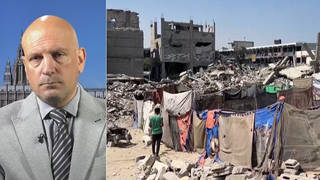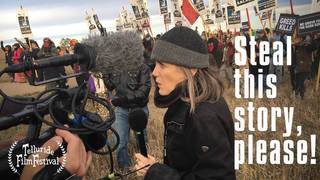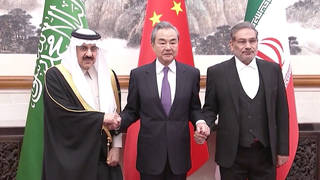
As protests erupt across the Middle East after Saudi Arabia’s execution of prominent Shia religious leader Sheikh Nimr al-Nimr, we speak with his friend Ali al-Ahmed, founder and director of the Institute for Gulf Affairs. “He said we should support the oppressed against the oppressor,” says al-Ahmed. He notes Sheikh al-Nimr was a small-town religious leader that relatively few had heard of before he was put to death, but since his execution memorial services have been held for him around the world. The Saudi government accused Nimr of calling for the overthrow of the Saudi royal family. He had been arrested multiple times, including in 2012 for his involvement in protests after the Arab Spring uprising. Ali al-Ahmed was one of Saudi Arabia’s youngest political prisoners when he was detained at age 14.
Transcript
AMY GOODMAN: Protests have erupted across the Middle East after Saudi Arabia executed prominent Shia religious leader Sheikh Nimr al-Nimr—along with 46 others—Saturday in the country’s largest mass execution in decades. The Saudi government accused Nimr of calling for the overthrow of the Saudi royal family. He had been arrested multiple times, including in 2012 after he was involved in protests after the Arab Spring uprising. Sheikh Nimr had also called for the secession of Saudi Arabia’s oil-rich Eastern Province, where the majority of the Sunni kingdom’s Shia population live. After his execution Saturday, protesters in the Iranian capital Tehran responded by torching part of the Saudi Embassy. On Sunday, Saudi Arabia responded by severing ties with Iran. This is Saudi Foreign Minister Adel al-Jubeir.
ADEL AL-JUBEIR: [translated] The kingdom, in light of these realities, announces the cutting of diplomatic relations with Iran and requests the departure of delegates of diplomatic missions of the embassy and consulate and offices related to it within 48 hours. The ambassador has been summoned to notify them. [in English] We are determined not to allow Iran to undermine our security. We are determined not to let Iran mobilize or create or establish terrorist cells in our country or in the countries of our allies.
AMY GOODMAN: Saudi Arabia has recalled its diplomats from Tehran and given Iranian diplomats 48 hours to leave Saudi Arabia. This is Iranian Supreme Leader Ayatollah Ali Khamenei.
AYATOLLAH ALI KHAMENEI: [translated] Killing a knowledgeable man, who promoted virtue and prevented vice and had religious zeal, is certainly a crime, a great crime. It is also a mistake, because the spilled blood will undoubtedly bring divine retribution. Saudi politicians, rulers and policymakers should have no doubt that there will be divine vengeance for this blood. God almighty will not pardon those who spill the blood of the innocent.
AMY GOODMAN: Saudi Arabia’s execution of Sheikh Nimr al-Nimr also led to protests in Iraq, Bahrain and several other countries. Bahrain says it, too, is severing diplomatic ties with Iran. Earlier today, two Sunni mosques about 50 miles south of the Iraqi capital, Baghdad, were rocked by bomb blasts thought to be retaliation against al-Nimr’s execution.
Meanwhile, the U.S. has called for dialogue. Analysts are watching closely to see how this will impact regional tensions. Saudi Arabia and Iran back opposing groups in Syria and Iraq, and are on opposite sides of the conflict in Yemen.
For more, we turn now to Ali al-Ahmed, the founder and director of the Institute for Gulf Affairs, one of Saudi Arabia’s youngest political prisoners when he was detained at the age of 14.
Welcome to Democracy Now!, Ali al-Ahmed. Can you talk about the significance of first what took place on Saturday, one of the largest mass executions in Saudi history, and the significance of Nimr al-Nimr, the sheikh?
ALI AL-AHMED: Yes. Good morning, Amy. It’s a pleasure.
The execution of Sheikh Nimr al-Nimr is really an important development, given the fact this is the first time in Saudi history where a Shia religious leader has been executed. Fifty years ago or so, another leader was sentenced to death, but he was not executed because he was abroad. This really creates a division within the country. In the Shia communities around the world, religious leaders are most revered, because they are the leaders of the community. And they are usually chosen by—people choose them as their leaders. It’s almost a democratic process.
So, for the Saudi government to recklessly execute him and others, including protesters, really is a reckless act that will have repercussions for a long time. I think this will start another chapter in the Saudi history, a chapter that I think we will see come to reality in 2016. And it will not end well for the Saudi monarchy. I think we’ve seen that in different areas where governments who targeted Shia religious leaders end up really with a mess on their hand, from Saddam Hussein to Gaddafi to others, who probably underestimated the will and the determination of the Shia communities to bring repercussions to them. And I believe the Saudi monarchy committed a huge mistake that is not going to work for them in the short and the long term.
AMY GOODMAN: You went to a memorial service for the victims of the mass execution. Can you tell us who Nimr al-Nimr, though, is, exactly what he represents, how he expressed his opposition to the Saudi regime?
ALI AL-AHMED: You’re absolutely right. Sheikh Nimr al-Nimr’s name—you know, a month or two months ago, nobody knew who Sheikh Nimr al-Nimr was. He was a religious leader from a small town in the eastern shore of Arabia. But since his execution, memorial services have been held for him across the United States, across Europe and different parts of the world. Sheikh Nimr is a friend of mine—was a friend of mine. I knew him probably 30 years ago. I met him. I met his family, his father. I visited their home. His brothers, younger brothers, are friends. So, I knew him.
Sheikh Nimr’s experience with the Saudi government dates back to his grandfather. His grandfather was also a fiery cleric who stood in the face of the Saudi oppression of the Shia minority 50, 60 years ago. So he inherited this zeal and the resolve to object to this oppression. If you look at his speeches, he expresses this strong determination and will. His words really are amazing words. And we will be translating a selection of his words to show you that when he speaks, really, as a free man, he said, “We either live free on this land, or we die inside of the Earth.” So—or he says that “We choose not to be ruled by the al-Saud. We choose to be free”—these words of freedom and dignity. And you mentioned the secession. He didn’t call for secession. He said that “Our dignity is more important than the geographical borders of Saudi Arabia. Our dignity comes supreme.” And I think that’s correct. The dignity of man, the dignity of a human being, is much more important than political unions. And his words really shows you he’s a rare individual.
And when Mr. Obama spoke about the need for Muslims to combat violence and extremism, Sheikh Nimr is a rare example of a person who calls for the people’s rule in a monarchy that does not allow the individual, Shia or Sunni, to have a say. He called for people’s power. And that really shows you an example, a shining example, of a religious—Muslim religious leader who is empowering people and their choices, who defended everyone, not only his community, but also he spoke of the Sunni oppressed. And he really created a new model. He said that we should not support Sunnis versus Shia or Shia versus Sunni; we should support the oppressed against the oppressor, no matter their religion, their sect and their ethnicity.
So I really think his words is going to live, and it will create this new wave. He was in the country of Saudi Arabia, which is divided around sectarian lines. He was admired by many Sunni young men for his words, for his courage. Inside a country, a kingdom of silence, his words really rang strong. And I think if you compare him to many people that we admire around the world, including the United States, you will see him really standing in the middle, in the lion’s den, and speaking without fear. He was courageous and will be remembered for a long time.
AMY GOODMAN: Ali al-Ahmed, his nephew remains on death row, or threatened with execution, who was, what, 17 when he went out to a protest, Ali Mohammed al-Nimr, and also the Palestinian poet Ashraf Fayadh. What will happen with them? They were not part of the 47, is that right, who were executed?
ALI AL-AHMED: Yes, yes. The Saudi government now is trying to make these executions—although the majority of the executed people are Sunnis, they are trying to make this, frame this into a Sunni-Shia tension. It’s not. It is really an attempt by the Saudi monarchy to silence their opposition and to label anybody who spoke against them as terrorists. And there is a plan to execute more people. The Saudis spread their executions across the country to—really, to spread terror in the heart of the population. The Saudi monarchy fear is that the population will rise against them. And the best way they think that they can silence this opposition and the aspiration of the young people in that country for people’s power is to execute people and to—publicly, by the way—and behead them, so the people will not rise.
AMY GOODMAN: Ali al-Ahmed, we’re going to break and then come back, and we’ll also be joined by professor Toby Jones and arms expert Bill Hartung to talk about the U.S. relationship with their very close ally, Saudi Arabia. Stay with us.












Media Options